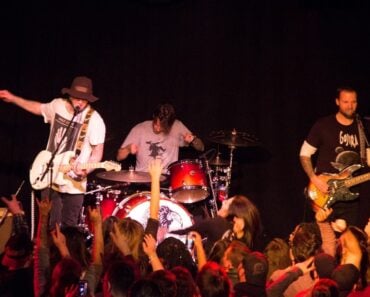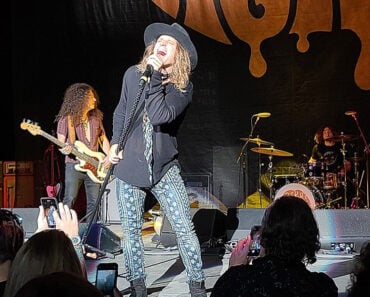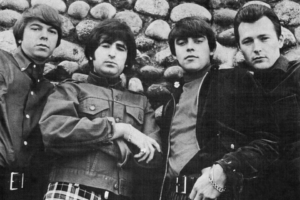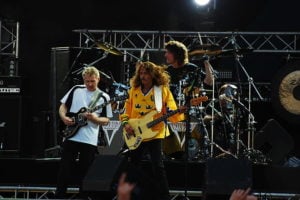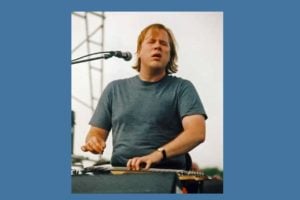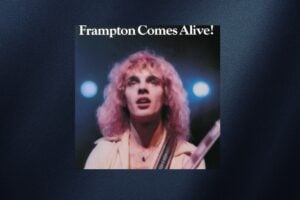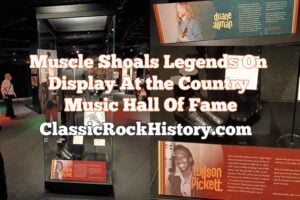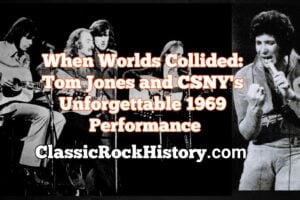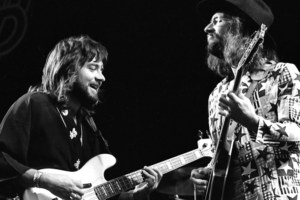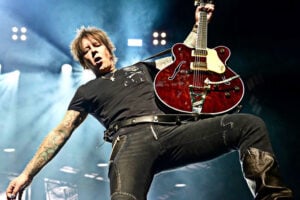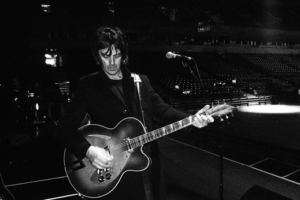
Feature Photo: Mattd523, CC BY 3.0 <https://creativecommons.org/licenses/by/3.0>, via Wikimedia Commons
Widespread Panic emerged from the Athens, Georgia music scene in 1986, initially performing as a six-piece ensemble before solidifying their lineup. The band has released thirteen studio albums, with several achieving notable commercial success on the Billboard charts. Their longevity spans nearly four decades, during which they have experienced two guitarist changes due to the death of founding member Michael Houser in 2002 and the subsequent replacement of George McConnell in 2006.
The band’s discography includes both studio and live releases, with their live performances becoming a hallmark of their career. They have sold millions of albums and accumulated a devoted following through extensive touring. The group experienced a significant transition when drummer Todd Nance departed in 2014 after nearly three decades with the band. Despite lineup changes, Widespread Panic has maintained three original members throughout their entire history.
Their commercial peak includes multiple albums charting in the top 10 of the Billboard 200, with several live releases achieving gold certification. The band has performed thousands of concerts across North America and internationally. They have headlined major music festivals and maintained an active touring schedule for over thirty-five years. The group’s ability to sustain their career through personnel changes and personal tragedies distinguishes their trajectory in the jam band genre.
John Bell
John Bell has served as Widespread Panic’s lead vocalist and rhythm guitarist since co-founding the band in 1986. He attended the University of Georgia, where he met future bandmate Michael Houser, and the two began playing music together before forming Widespread Panic. Bell’s vocal style and rhythm guitar work have been constants throughout the band’s entire catalog, appearing on every studio album from “Space Wrangler” in 1988 through “Street Dogs” in 2015. His songwriting contributions have been substantial across all releases, with his lyrics often exploring Southern Gothic themes and personal narratives. Bell’s rhythm guitar playing provides the foundational harmonic structure that supports the band’s extended improvisational passages.
Throughout his tenure with Widespread Panic, Bell has contributed significantly to albums like “Everyday” in 1993, which featured his vocals on tracks that helped define the band’s sound during their breakthrough period. His work on “Bombs & Butterflies” in 1997 showcased his developing songwriting maturity, while “Earth to America” in 2006 demonstrated his ability to adapt to new band personnel following Michael Houser’s death. Bell’s vocal performances on live releases have been equally important to the band’s identity, with his stage presence documented across numerous concert recordings. His ability to maintain vocal consistency while performing hundreds of shows annually has been essential to the band’s touring success.
Outside of Widespread Panic, Bell has pursued various musical projects that showcase his versatility as a performer. He has appeared as a guest vocalist with numerous other artists and bands within the jam band community. Bell has participated in tribute concerts and special musical events that celebrate Southern rock and improvisational music traditions. His influence extends beyond performance to mentoring younger musicians in the Athens music scene. Bell has maintained his residence in the Athens area throughout his career, remaining connected to the community where Widespread Panic originated.
Dave Schools
Dave Schools joined Widespread Panic as bassist in 1986, becoming one of the founding members alongside John Bell and Michael Houser. He attended the University of Georgia, where he became integrated into the Athens music scene that spawned the band. Schools’ bass playing appears on every Widespread Panic studio album, starting with “Space Wrangler” and continuing through the band’s entire discography. His low-end work provides both rhythmic foundation and melodic counterpoint, particularly evident on albums like “Ain’t Life Grand” in 1994 and “Til the Medicine Takes” in 1999. Schools’ technical proficiency allows him to navigate complex improvisational sections while maintaining groove integrity during extended jams.
His contributions to specific albums demonstrate his evolving approach to the instrument and composition. On “Bombs & Butterflies” in 1997, Schools’ bass lines showed increased complexity and experimentation with effects processing. The album “Don’t Tell the Band” in 2001 featured his playing during the final recordings with original guitarist Michael Houser, capturing a particularly poignant period in the band’s history. Schools adapted his playing style to accommodate new guitarist George McConnell on “Ball” in 2003 and again for Jimmy Herring on “Earth to America” in 2006. His vocal contributions, while less prominent than Bell’s, add textural variety to the band’s recorded output and live performances.
Schools has maintained an active career outside Widespread Panic through various collaborations and side projects. He has worked with the supergroup Hard Working Americans, which features members of other notable rock and Americana bands. Schools has produced albums for other artists and contributed bass to recording sessions across multiple genres. He has participated in benefit concerts and musical fundraisers for various causes. Schools’ reputation as a skilled bassist has led to guest appearances with numerous touring acts and festival performances outside of his primary band commitments.
Domingo S. Ortiz
Domingo S. Ortiz has been Widespread Panic’s percussionist since the band’s formation in 1986, making him one of the three remaining original members. He brought Latin percussion influences to the band’s sound from the beginning, adding congas, timbales, and various hand percussion instruments to their sonic palette. Ortiz appears on every studio album in the band’s catalog, with his percussion work particularly prominent on tracks that incorporate world music elements. His contributions to “Space Wrangler” helped establish the band’s willingness to blend rock improvisation with diverse rhythmic traditions. On “Everyday” in 1993, Ortiz’s percussion work became more integrated into the songwriting rather than existing as purely supplemental texture.
His playing on subsequent albums demonstrated increasing sophistication and restraint. “Bombs & Butterflies” in 1997 featured Ortiz’s percussion as an integral compositional element rather than embellishment. The album “Til the Medicine Takes” in 1999 showcased his ability to create atmospheric soundscapes through selective use of percussion instruments. Ortiz adapted his playing through the band’s various guitarist changes, maintaining consistency while supporting new musical directions. His work on “Wood” in 2012 and “Street Dogs” in 2015 reflected decades of experience while incorporating contemporary approaches to percussion in rock contexts.
Ortiz has maintained a relatively lower public profile compared to other band members but has contributed to the Athens music community throughout his career. He has participated in percussion workshops and educational events focused on Latin and world music traditions. Ortiz has occasionally performed with other musicians in the Athens area outside of Widespread Panic commitments. His dedication to the band has been demonstrated through nearly four decades of consistent touring and recording. Ortiz’s percussion work has influenced numerous musicians within the jam band genre who have sought to incorporate diverse rhythmic traditions into rock-based improvisation.
John Hermann
John Hermann joined Widespread Panic as keyboardist in 1992, replacing T Lavitz and expanding the band’s sonic possibilities. Prior to joining Widespread Panic, Hermann had established himself as keyboardist and vocalist for the band Beanland, which had its own following in the Southern music scene. His first studio appearance with Widespread Panic came on the album “Everyday” in 1993, where his keyboard work immediately broadened the band’s textural range. Hermann’s playing incorporates elements of jazz, blues, and classical music into the band’s improvisational framework. His vocal contributions added another dimension to the band’s harmonic capabilities, with his voice appearing on numerous tracks throughout his tenure.
Hermann’s keyboard work has been essential to albums including “Ain’t Life Grand” in 1994 and “Bombs & Butterflies” in 1997, where his organ and piano playing filled significant sonic space. On “Til the Medicine Takes” in 1999, Hermann’s keyboards took on more prominent roles in both composed sections and improvisational passages. He navigated the transition following Michael Houser’s death, with his playing on “Ball” in 2003 helping to maintain musical continuity during a difficult period. Hermann’s work on “Earth to America” in 2006 and subsequent albums demonstrated his ability to integrate with new guitarist Jimmy Herring while preserving the band’s established sound. His keyboard contributions on “Wood” in 2012 and “Street Dogs” in 2015 reflected his complete assimilation into the band’s creative process.
Outside of Widespread Panic, Hermann has maintained various musical projects and collaborations. He has performed with other musicians from the jam band and Southern rock communities in various configurations. Hermann has appeared at music festivals in settings outside of Widespread Panic, demonstrating his versatility across different musical contexts. He has contributed keyboard work to other artists’ recordings and participated in special tribute concerts. Hermann’s musicianship has earned him recognition beyond his primary band, with his keyboard playing cited as influential by younger musicians in similar genres.
Jimmy Herring
Jimmy Herring became Widespread Panic’s lead guitarist in 2006, replacing George McConnell and bringing extensive experience from various jazz fusion and rock projects. Prior to joining Widespread Panic, Herring had established himself as a virtuoso guitarist through work with Aquarium Rescue Unit, Jazz Is Dead, The Allman Brothers Band, and Phil Lesh and Friends. His technical proficiency and improvisational vocabulary brought new dimensions to the band’s sound. Herring’s first studio album with Widespread Panic was “Earth to America” in 2006, where his playing demonstrated immediate chemistry with the established members. His guitar work combines rock, jazz, and fusion influences while respecting the band’s existing musical identity.
Herring’s contributions to “Wood” in 2012 showcased his complete integration into Widespread Panic’s compositional and improvisational approaches. The album featured his guitar work across various styles and moods, from aggressive rock passages to delicate melodic statements. On “Street Dogs” in 2015, Herring’s playing reflected nearly a decade of experience with the band, with his solos and rhythm work fully assimilated into their collective sound. His ability to navigate extended improvisational sections while maintaining melodic coherence has been essential to the band’s live performances. Herring’s technical capabilities allow the band to explore more complex harmonic territory while retaining their fundamental character.
Herring has maintained an active solo career alongside his work with Widespread Panic, releasing several albums under his own name. His solo recordings explore jazz fusion and instrumental rock territory that differs from his work with the band. Herring has continued to perform with other musicians and groups, participating in special projects and festival appearances outside of Widespread Panic commitments. He has been recognized by guitar publications and polls as one of the premier guitarists in his genre. Herring’s influence extends to guitar education, with his playing studied by aspiring musicians seeking to master improvisational techniques. His addition to Widespread Panic has been credited with extending the band’s creative vitality into their fourth decade.
Duane Trucks
Duane Trucks joined Widespread Panic as drummer in 2014, replacing founding member Todd Nance after Nance’s departure. Trucks came from a distinguished musical lineage as the nephew of Allman Brothers Band drummer Butch Trucks and had established himself through work with various Southern rock and jam band projects. Prior to joining Widespread Panic, Trucks had performed with Col. Bruce Hampton, Circles Around the Sun, and other acts within the improvisational rock community. His drumming style combines power with subtlety, allowing him to drive the band’s energetic performances while providing dynamic variation. Trucks’ first studio album with Widespread Panic was “Street Dogs” in 2015, where his drumming demonstrated both respect for the band’s established sound and his own distinctive approach.
His contributions on “Street Dogs” showed his ability to adapt to the band’s catalog while bringing fresh rhythmic ideas. Trucks’ drumming provides the foundation for the band’s extended improvisational sections, with his timekeeping and dynamic control essential to their live performances. He has had to learn an extensive catalog of songs spanning three decades while developing musical chemistry with band members he had not previously played with regularly. Trucks’ integration into Widespread Panic required navigating the sensitivity around replacing a founding member who had been with the band for twenty-eight years. His approach has balanced honoring the existing material while contributing his own musical personality.
Outside of Widespread Panic, Trucks has maintained involvement in various musical projects and collaborations. He has performed with Circles Around the Sun, a project that gained recognition through music created for Grateful Dead tribute events. Trucks has appeared as a guest drummer with other artists and bands within the jam band and Southern rock communities. His family connections within the music industry have provided opportunities for special performances and collaborative projects. Trucks has participated in tribute concerts honoring his uncle Butch Trucks and other influential musicians. His drumming has been recognized for its technical proficiency and musical sensitivity, earning respect from musicians across multiple genres.
Todd Nance
Todd Nance was Widespread Panic’s drummer from the band’s formation in 1986 until his departure in 2014, making him one of the longest-tenured founding members. He attended the University of Georgia, where he connected with the other musicians who would form the band. Nance appeared on every studio album from “Space Wrangler” in 1988 through “Street Dogs” in 2015, though he had departed before the final album’s recording. His drumming style emphasized groove and dynamics over technical flash, providing a solid foundation for the band’s improvisational excursions. Nance’s work on early albums like “Space Wrangler” and “Widespread Panic” in 1991 established the rhythmic feel that would define the band’s sound.
His drumming contributions evolved throughout his tenure, with albums like “Everyday” in 1993 and “Ain’t Life Grand” in 1994 showcasing his developing sophistication. On “Bombs & Butterflies” in 1997, Nance’s playing demonstrated increased restraint and musicality, with his drum parts serving the songs rather than dominating them. The album “Til the Medicine Takes” in 1999 featured some of his most nuanced work, with subtle dynamic shifts and creative fills. Nance’s vocals occasionally appeared on recordings, adding variety to the band’s sonic palette. His partnership with percussionist Domingo Ortiz created a distinctive rhythmic texture that became central to Widespread Panic’s identity. Nance played on “Ball” in 2003, “Earth to America” in 2006, and “Wood” in 2012, maintaining consistency through the band’s guitarist changes.
Nance’s departure from Widespread Panic in 2014 ended his twenty-eight-year run with the band, with the separation attributed to personal and professional factors. Following his exit, he participated in various musical projects and performed with different musicians in smaller venues. Nance struggled with substance abuse and health issues in his later years. He formed the band brute with members of Bloodkin and other Athens musicians, allowing him to continue performing after leaving Widespread Panic. Nance passed away in 2020, prompting tributes from the music community and recognition of his contributions to the jam band genre. His drumming influenced numerous musicians who followed Widespread Panic and studied the band’s extensive live recording catalog.
Michael Houser
Michael Houser co-founded Widespread Panic in 1986 and served as the band’s lead guitarist until his death in 2002. He met John Bell while both attended the University of Georgia, and their musical partnership became the creative core of the band. Houser appeared on every studio album from “Space Wrangler” in 1988 through “Don’t Tell the Band” in 2001. His guitar playing emphasized melody and space over technical virtuosity, with his solos often developing gradually across extended improvisational sections. Houser’s work on “Space Wrangler” established his approach to the instrument, with flowing melodic lines that built tension and release over time. His compositions contributed significantly to the band’s repertoire, with songs that became staples of their live performances.
Houser’s guitar work on “Everyday” in 1993 captured him at a creative peak, with his playing demonstrating both technical proficiency and emotional depth. The album “Ain’t Life Grand” in 1994 featured his guitar across various musical settings, from aggressive rock to delicate acoustic passages. On “Bombs & Butterflies” in 1997, Houser’s playing showed increasing sophistication, with his solos incorporating jazz and blues influences. His work on “Til the Medicine Takes” in 1999 reflected his mature approach to the instrument, with carefully constructed solos that served the songs’ emotional content. Houser’s final studio album, “Don’t Tell the Band” in 2001, was recorded while he battled pancreatic cancer, with his playing demonstrating remarkable focus despite his declining health.
Houser was diagnosed with pancreatic cancer in 2002 and passed away in August of that year at age forty. His death devastated the band and their fanbase, with his influence on the jam band genre widely acknowledged. Prior to his illness, Houser had maintained a relatively private life focused primarily on his work with Widespread Panic. He was known for his dedication to his instrument and his reluctance to seek attention outside of his musical contributions. Houser’s guitar playing has been studied by musicians seeking to understand melodic improvisation within rock contexts. His approach to the guitar emphasized listening and responding to other band members rather than dominating musical space. Memorial concerts and tributes have honored his contributions to music, with his influence continuing to resonate within the jam band community decades after his death.
T Lavitz
T Lavitz served as Widespread Panic’s keyboardist from 1991 to 1992, filling a brief but significant role in the band’s development. Prior to joining Widespread Panic, Lavitz had established himself as keyboardist for the Dixie Dregs, a progressive rock and jazz fusion band that had achieved critical acclaim. His extensive background in jazz fusion brought new harmonic and textural possibilities to Widespread Panic’s sound. Lavitz’s tenure with the band was documented on live recordings but he did not appear on any studio albums, as his time with the group fell between studio recording cycles. His keyboard work during this period helped the band explore more complex musical territory during live performances.
Lavitz’s departure from Widespread Panic in 1992 opened the position for John Hermann, who would remain with the band for decades. The reasons for Lavitz’s brief tenure involved both musical direction and logistical considerations related to his other professional commitments. Despite his short time with Widespread Panic, Lavitz’s influence on the band’s willingness to incorporate keyboards as a central element rather than supplemental texture was significant. His professional approach and musicianship left an impression on the band during a formative period. Lavitz’s work with Widespread Panic represented only a small portion of his broader musical career.
Following his time with Widespread Panic, Lavitz continued working with the Dixie Dregs and pursued various jazz fusion projects. He released several solo albums that showcased his virtuosity as a keyboardist and composer. Lavitz performed with numerous musicians across jazz, rock, and fusion genres throughout his career. He participated in educational clinics and workshops focused on keyboard technique and improvisation. Lavitz passed away in 2010 following injuries sustained in a motorcycle accident. His contributions to progressive rock and jazz fusion earned him recognition from keyboard publications and fellow musicians. Lavitz’s work outside of Widespread Panic ultimately defined his legacy more than his brief tenure with the band.
George McConnell
George McConnell joined Widespread Panic as lead guitarist in 2002, replacing Michael Houser following Houser’s death from pancreatic cancer. Prior to joining Widespread Panic, McConnell had established himself as guitarist for Beanland and had connections to the Southern music scene that spawned the band. His appointment came during an emotionally difficult period, as he was tasked with filling the role of a deceased founding member who had been central to the band’s identity. McConnell appeared on two studio albums with Widespread Panic: “Ball” in 2003 and the live studio album “Jackassolantern” in 2005. His guitar playing brought a different approach than Houser’s, with a more aggressive tone and different improvisational vocabulary.
McConnell’s work on “Ball” demonstrated his attempt to honor the band’s established sound while contributing his own musical personality. The album received mixed responses from fans who were adjusting to the post-Houser era. His guitar work provided the necessary technical capabilities to perform the band’s extensive catalog while adding his own interpretations during improvisational sections. McConnell’s tenure with the band lasted four years, during which he toured extensively and appeared on numerous live recordings. His departure in 2006 was attributed to musical and personal factors, with both the band and McConnell acknowledging that the fit had not been ideal. The separation was described as amicable, with mutual recognition that the collaboration had run its course.
Following his departure from Widespread Panic, McConnell continued performing with various musical projects. He formed the band Kudzu Kings and participated in other Southern rock and jam band collaborations. McConnell has performed at smaller venues and festivals, maintaining an active presence in the Southern music scene. He has been candid in interviews about the challenges of joining Widespread Panic under difficult circumstances and the pressure of replacing a beloved founding member. McConnell’s guitar playing outside of Widespread Panic has allowed him to pursue his own musical direction without the burden of expectations. His time with the band represented a transitional period that allowed Widespread Panic to continue functioning while ultimately seeking a different musical direction with Jimmy Herring.
Check out more Widespread Panic articles on ClassicRockHistory.com Just click on any of the links below……
Complete List of Widespread Panic Albums And Discography
Top 10 Widespread Panic Songs
Read More: Artists’ Interviews Directory At ClassicRockHistory.com
Read More: Classic Rock Bands List And Directory



